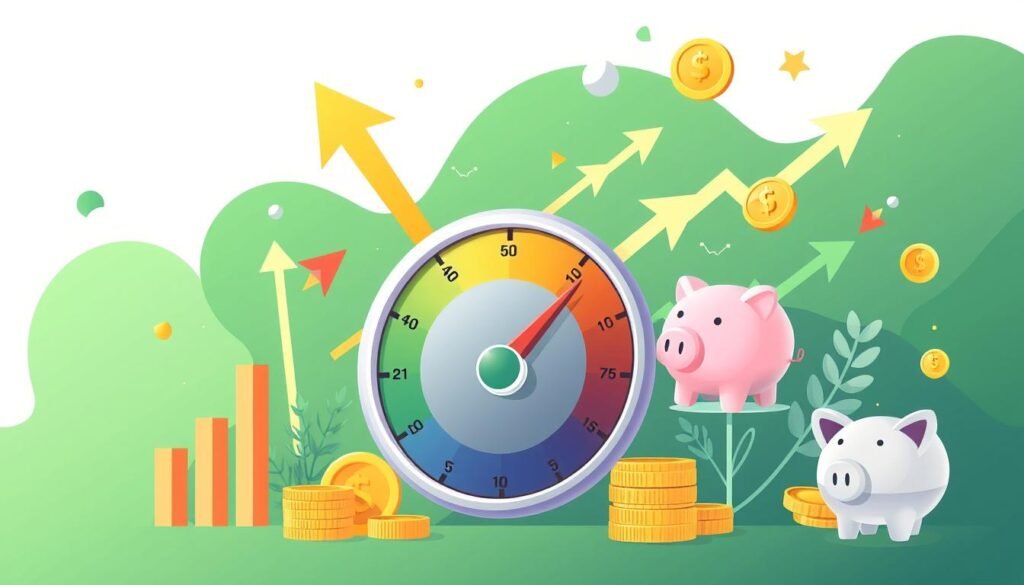This post may contain affiliate links, which means I may earn a commission if you purchase through these links at no extra cost to you
Have you ever wondered why building credit matters—especially when you’re not even thinking about getting a loan yet? I used to feel the same way, but I’ve learned that credit plays a big role in everyday life. From getting approved for an apartment to setting up utilities, having good credit opens doors. Without it, simple things can become unexpectedly difficult.
When I started my own credit journey, it felt overwhelming at first. But the truth is, getting started is totally doable with the right steps. In this guide, I’ll walk you through how to begin and explain why building credit is so important. I’ll share practical tips like using a secured credit card, becoming an authorized user on someone else’s account, and looking into credit-builder loans. These steps helped me—and they can help you too—build a strong credit foundation for the future.
Table of Contents
ToggleUnderstanding Credit and Its Importance
Understanding your credit is crucial for managing money well. Credit means borrowing money and promising to return it later, usually with extra interest. It’s a tool for big purchases and a way to show how trustworthy you are through scores and reports.
What is Credit?
Credit is a key part of financial life in the United States. It lets you get things now and pay later, based on trust. Before giving loans or credit cards, companies will look at your credit history. This history is kept by big credit bureaus like Equifax, Experian, and TransUnion.
Why Good Credit is Critical
Having good credit matters a lot. It affects the loan terms and interest rates lenders give you. Things like your payment history, how much of your credit you use, and how long you’ve had credit matter for your score. A high score helps you get better deals, like student cards without yearly fees.
Impact of Credit on Various Aspects of Life
Your credit is more than just about loans; it affects many parts of life. A good score can help with job hunting, finding a place to live, and getting car loans. Bad marks, like paying late, stick around for seven years and hurt your financial health. Keeping credit use low and mixing different credit types can improve your credit health.
| Credit Aspect | Explanation |
|---|---|
| What is Credit? | A financial arrangement for borrowing funds and repaying later, accompanied by a credit report from bureaus like Equifax, Experian, and TransUnion. |
| Good Credit | Essential for securing favorable loan terms. Influences interest rates and access to financial opportunities. |
| Life Impact | Affects employment, housing, and auto loans. Good credit management improves life’s financial aspects. |
How to Build Credit from Scratch
Starting to build credit might feel tough, but it’s doable with smart choices and hard work. To start your credit journey off right, check out these methods.
Secured Credit Cards
Secured credit cards are great for beginners. You pay a deposit upfront, which usually sets your credit limit. They’re easy to get with no credit history. By using these cards and paying on time, you boost your credit score.

Becoming an Authorized User
Getting added as an authorized user on someone’s credit card can also help. This way, the main cardholder’s good credit habits help you too. Just make sure they pay their bills on time, so you benefit.
Credit-Builder Loans
Credit-builder loans are for those wanting to start or improve their credit. These loans work differently: you pay first, then get the money. This shows you can handle debt, lifting your credit score as you go.
Here’s a fast look at these options:
| Credit Option | Requirements | Benefits |
|---|---|---|
| Secured Credit Cards | Security Deposit | Helps establish credit with controlled risk |
| Authorized User | Trusted Primary Cardholder | Benefits from another’s positive credit history |
| Credit-Builder Loans | Payment before fund access | Builds credit through demonstrated payment responsibility |
To build your credit, you can use secured credit cards, be an authorized user, or get a credit-builder loan. Remember, creating credit from nothing takes time and careful spending. But, achieving a high credit score is totally worth it.
Tips for Managing and Improving Your Credit
Efficient credit management is key for a good credit score. We’ll cover some top strategies for you.
Always Pay on Time
Your payment history is a big part of your credit score, about 35%. It’s vital to always make at least the minimum on-time payments. Even one late payment can hurt your score. To avoid late payments, consider automatic payments or set reminders.
Keep Your Credit Utilization Low
Your credit utilization ratio is also crucial. It shows how much credit you use compared to what you have. Aim to keep this ratio under 30%. People with the best credit scores often have utilization in the single digits.
Try paying down credit card balances and ask for higher credit limits without increasing your balance. This can improve your score quicker. Keeping your credit card debt low and paying off balances in full keeps your utilization ratio low.
Avoid Excessive Credit Inquiries
Applying for new credit can help, but you must be smart about it. Too many credit inquiries in a short time can drop your score. So, apply for new credit sparingly and only when it really benefits you.
| Strategies | Benefits |
|---|---|
| On-time Payments | Largest scoring factor; improves payment history |
| Low Credit Utilization | Optimizes credit score; recommended under 30% |
| Limit Credit Inquiries | Prevents score reduction from excessive inquiries |
Using these tips can help you manage your credit better. This leads to an improved score and better financial opportunities.
Tracking and Monitoring Your Credit
It’s important to keep an eye on your credit to stay financially healthy. Regular credit monitoring can help you build and maintain a strong credit score.
Checking Your Credit Reports
Your credit reports from Equifax, TransUnion, and Experian show your financial actions. They list your payments, credit mix, balances, and how long you’ve had credit. Checking these reports every year ensures they are correct and lets you spot any mistakes. About 44 percent of people find errors on their credit reports. That’s why it’s important to check yours often. Websites like Credit Karma offer free access to your credit scores and financial accounts monitoring.
Disputing Errors on Your Credit Report
Disputing credit errors is vital under the Fair Credit Reporting Act (FCRA). It keeps your credit reports accurate. Negative info, like late payments, can hurt your credit score for seven years. If you find a mistake, contact the credit bureau to dispute it. There are tools available to help correct errors quickly.
Monitoring Your Credit Progress
Using credit monitoring tools helps you track your good credit efforts. These tools keep you updated on changes, like new accounts or inquiries. Experian Boost, for example, can increase your score by 13 points on average by adding on-time utility and rent payments to your credit reports. Effective credit monitoring lets you stay informed about your credit status and act fast when needed.

Final Thoughts
Starting to build credit from the ground up is very rewarding and important for your financial future. By learning the basics of credit and its role in life, you set up a strong base. Starting with secured credit cards, becoming an authorized user, and getting credit-builder loans are good first steps.
To improve your credit score, pay on time, keep your credit use low, and don’t ask for too many credit checks. Keeping up your credit is ongoing. It needs careful attention and steady effort. Regularly check your credit reports and correct any mistakes to keep your credit in good shape.
By using these strategies, you’re on your way to financial success. The most important things are patience and discipline. This way, you can go from low or fair credit (300-669) to good credit (670-739) or better. This opens up many financial advantages. Good credit leads to great opportunities and is worth the effort.



